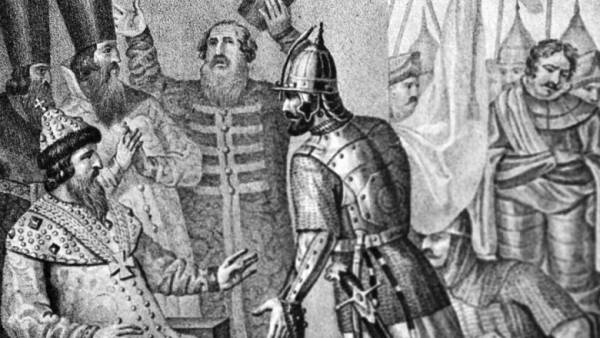As a knight-spy saved from destruction the army of Ivan III
The agent of the Prince of Moscow.

The past year was marked by several spy scandals. However, on the background of the story of “the Rookie” and solsberijsky spires in the background broke the case of an officer of the Main staff of the defence forces of Estonia Denis Metsavere and Lithuanian politician and former member of the Seimas Algirdas Paleckis. Both were accused of spying for Russia. Meanwhile, the Baltic direction has already entered the sphere of interests of the Russian special services. So long ago that this was in the time of legends. One of them is based on events 500 years ago, when in 1502 occurred the battle of lake Smolino is not as well known as the “massacre” at Chud, but no less important for Russian history. With the victory of Russian arms over the Livonian order is the story of the treason of a certain knight Lucas von Hammerstedt. Some historians claim that knight was recruited by a “foreign intelligence service” of Ivan III. “Ribbon.ru” recalled the events of those early years and tried to understand the motives and circumstances of this are not chivalrous, but useful for action.
On the Livonian front
A large part of the reign of Grand Prince Ivan III took place in wars. This ruler, who became the founder of the unified Russian state, finally threw off the Tatar yoke, attached to the Grand Duchy of Moscow Novgorod Republic and a number of principalities, conquered many of the Russian land from the Lithuanians. One of the many enemies of Moscow at that period were the Teutonic order or Livonian landmeister it is situated on the lands of modern Lithuania, and Estonia.
In the beginning of XVI century a branch of the order in Livonia was led by energetic and enterprising landmaster (master) Walter von Plettenberg. It is with great caution followed the rise of “Muscovite” and advocated an Alliance with the Grand Duchy of Lithuania against a common enemy. Another armed conflict between the Order and Moscow began on the initiative of the first in 1501. The moment George chose a very correct, as the hands of Ivan III at the time was associated by the war with the Lithuanians. The allies had hoped at least to weaken the Russian state, and if you’re lucky, and completely disintegrate.
And at first fortune smiled at the Plettenberg. In 1501-m after the feast of St. Bartholomew (August 24) the landmaster with his horsemen and infantry met with much superior numbers of the Moscow army at the river Serica near Izborsk. In battle totally showed all his talent as a commander and defeated the Russian troops, turning them to flight. The Livonians went to the Russian convoys.
After that, the landmaster ravaged much of the Russian lands, plundered the Island and the surroundings of Izborsk, burned Ivangorod, killing many people there. And if not for the pestilence that overtook his army, Plettenberg could cause the Russian far greater damage. But returned to Livonia because of the disease, the German army went to improve their health to winter quarters in their own castles. He Plettenberg, as the chroniclers write, had suffered from severe “physical exhaustion”.
Meanwhile, the Russian gathered his forces after the defeat at Izborsk, attacked Livonia. In retaliation for a daring RAID Russian ravaged all of Dorpat bishopric, half of the Riga bishopric, Marienburg region, city Trevathan, Ermis, Harvest, Fallin, lais, Oberpahlen, of virland, Narva, killed or took prisoner 40 thousand people.
This black band for the Order is not over. The situation was aggravated by the unsuccessful knights battle castle Helmet 20 Nov 1501. However, in Livland this battle declared victory: allegedly there the Germans put over a thousand Muscovites together with their main commander, Prince Alexander Obolensky. In fact, the opposite happened.
The Livonians went out to meet Russian “with great force, with cannon and musket,” but, according to the chronicler, “governors of Grand Prince beat, one beat, the other poimayu, and many of them leaked, and beat the nasty Germans for 10 miles, not the bright swords of their seconds, but was beaten like a pig by Morningstar (a kind of Mace, at the head of which is fixed six metal plates)”. However, Obolensky Livonians actually killed, which allowed Plettenberg to claim victory. However, the Livonian Chronicles are silent about the fact that Prince Obolensky was not in command of all the army, and one of the vanguards. The Russian army was led by the famous warlord Prince Daniel Schenya — one of the best generals of Ivan III, famous for the fact that in the 1500-m routed the river Vedroshi a large Lithuanian army Hetman Constantine Ostrog.
After the battle Helmed military action in the region has temporarily fallen, but recovered Plettenberg wanted to get even for the defeat. In 1502, at a Landtag in Wolmera the landmaster with the support of the Archbishop of Riga managed to get agreement on the continuation of the war. In March, the Livonians once again went to the Russian land and plundered the city South of Pskov. And when I received intelligence reports that the Grand Duke of the Muscovites threw almost all of their forces at Smolensk, Plettenberg decided that while the Russians are busy with the Lithuanians, the time to strike.